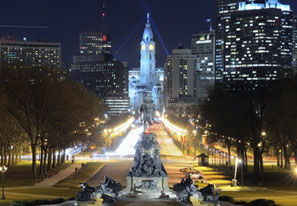
Michael Nutter, Philadelphia’s mayor since 2007, is term-limited. His record, while mixed, has had one clear success: the City of Brotherly Love has enjoyed a remarkable reduction in violent crime, particularly murder. In 2007, 391 homicides took place in Philadelphia, a ghastly number for a city of only 1.5 million people. That figure dropped to 248 last year. Philadelphia still suffers from a higher murder rate than Chicago (not to mention New York and Los Angeles), but the city has made undeniable progress during Nutter’s tenure.
Like Rudy Giuliani and Michael Bloomberg in New York, Nutter (and his police commissioner, Charles Ramsey) embraced proactive policing—including the controversial stop, question, and frisk tactic—to turn the crime situation around. Cops can frisk suspects for weapons only when they have established a “reasonable suspicion.” A 2011 consent decree requires the city to maintain records on each stop. (Even the ACLU has praised the arrangement.) Under Nutter, the city continued its use of data-driven policing, which, through sophisticated analysis of crime statistics, helps ensure that officers are where they need to be. Commissioner Ramsey has also revived some effective old-school policing tactics, like foot patrols. And Nutter has been one of the few Democrats to speak in moral terms about violent criminals, and not just the depredations of bad cops. The mayor seems genuinely outraged by the senseless violence that all too often occurs on Philadelphia’s streets.
In all this, he stands in stark contrast to the winner of the May 19 Democratic primary, former city councilman Jim Kenney, who campaigned on a promise to “end stop and frisk responsibly”—though he had enthusiastically backed the practice back in the 1990s. Kenney, who will probably face only token Republican opposition in November, is Philly’s answer to Bill de Blasio; in fact, New York’s mayor endorsed him just before the primary. He ran as a liberal’s liberal, backing a $15 minimum wage, bashing charter schools, arguing that stop, question, and frisk drives a “wedge between citizens and police,” and calling for the outfitting of all Philly cops with body cameras. He won easily, taking a solid majority of the vote in a five-candidate field.
During the campaign, Kenney played up his Philadelphia-style populism, calling New Jersey governor Chris Christie a “fat-assed creep” after Christie was spotted in Dallas Cowboys owner Jerry Jones’s box at an Eagles game. Despite his blunt streak, Kenney stitched together a coalition of white liberals, labor unions, and, notably, more than a few African-Americans. In a way, this is heartening: it shows that the old days of voters simply pulling the lever for the candidate who looks like them may be on the wane. (Kenney’s main rival was an African-American, state senator Anthony H. Williams.)
But Kenney’s victory is still troubling. His plan to jettison Nutter’s policing policies could lead to a reversal of Philadelphia’s public-safety advances. After all, as Nutter spokesman Mark McDonald has said, stop, question, and frisk is “one of the many tools that the city has used to drive down violent crime.” And, of course, the poor and disenfranchised—the constituency for which Kenney claims to speak—will bear the brunt of any uptick in violence.
That Nutter will almost certainly be succeeded in the mayor’s office by Kenney demonstrates the truth of Intel cofounder Andy Grove’s insight that “success breeds complacency.” It’s precisely because Nutter’s policies have proved so effective that many Philadelphians think that they can afford to abandon them.